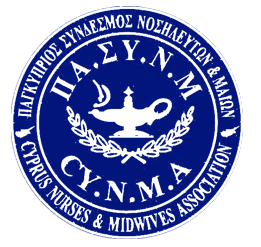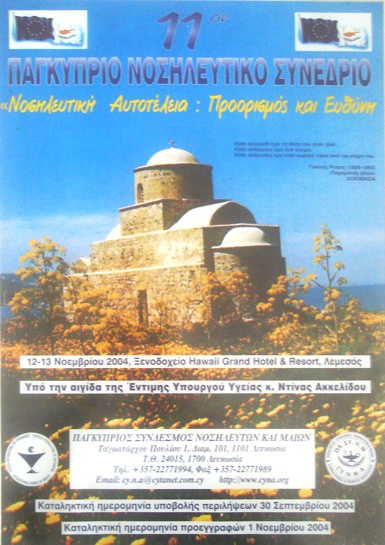

11ο Παγκύπριο Συνέδριο Νοσηλευτικής και Μαιευτικής
The 11th annual Cyprus Nursing Conference took place in Limassol on 12-13 November 2004, it focused on the theme “Nursing Independence: Destination and responsibility “.
It was attended by more than 500 Greek Cypriot nurses. As in previous conferences, more than fifty colleagues from Greece were also present.
The specific conference is of historical importance because it is the first one organised following the establishment of the Nursing Division of the Ministry of Health and the accession of Cyprus to the European Union.
These two parameters placed the destination of Nursing and the responsibilities of Nurses on a new level. It was noticed that Nursing independence, without internal cohesion, professional growth, education and promotion of professionalism, includes many threats and dangers.
1. Conclusions
The following conclusions have been drawn from the presentations and proposals of the conference:
1.1. The delivery of health care is offered to every human despite sex, race, religion or nationality. The population of our country today is multicultural. Consequently, the need for adaptation and enrichment of nursing education and practice with cross-cultural subjects is necessary. Quality assurance in nursing and the recognition of the societyʼs needs are argued through research which should be supported by the appropriate methodology.
1.2. Nurses find themselves confronted with cardiac cases and urgent incidents. Their management, apart from specialised knowledge, requires techniques and skills that can be ensured through continuous professional growth, education and practice. It has emerged from research that health professionals have insufficient knowledge in the management of Cardiopulmonary resuscitation (CPR). Further development of knowledge and skills are needed as well as updated trends on the ethical and legal aspects in CPR.
Simultaneously, the public should be offered, educational programs in CPR on a continuous basis. More specifically, programs should be offered to those individuals that have been classified in the high risk groups.
1.3. Child abuse constitutes a diachronic and a global phenomenon with direct and long term repercussions to mental health, and serious consequences to the quality of life. Nurses need to play a serious advisory, coordinative and supporting role in the physiologic growth and adaptation of children in the society.
1.4. Specialization of nurses promotes nursing in terms of providing effective care. Developments in all specialities are extensive. In technology and research new tendencies and differentiation of philosophy of nursing care are focused on patient education. Furthermore, the knowledge and significance of change and its supportive theories are considered necessary in the continuously evolving environment of the health sector.
1.5. The necessity of utilising a scientific approach in the sector of mental health is important. The role of mental health Nurses, as well as all nurses, working in the clinical settings and the community is extending, mainly in the aspect of counselling and health education for the management of situations like drug addiction and rehabilitation programs.
1.6. Nurses are facing the individual, family, social and psychological problems of patients, and their significant others. In order to cope nurses need support themselves. Reflective practice increases the probability of learning from experience, strengthens the multidisciplinary team, maintains high levels of qualitative clinical practice, limits the gap between theory and practice and changes the perceptions of nurses positively.
1.7. Development of programs in Community Nursing with the main focus on Primary Health Care; will contribute to the improvement of quality of life of the society.
1.8. The Nursing Division will contribute in the work of the Ministry of Health concerning the identification of staffing needs, organisation, administration, co-ordination, research, control and professional development towards more effective and qualitative health care.
Support by all is essential and imposed.
It is hoped that new knowledge and the stimuli that were acquired by the attendants of the conference, will constitute a source of inspiration and when all return back to practice everyone will share their experiences with colleagues so that a better quality of care can be provided.
2. Evaluation of the Conference
2.1 Evaluating the conference, participants completed the evaluation forms. They suggested topics that would interest them for future reference.
2.2 General Comments and Proposals
Opinions and proposals of participants expressed via the conference questionnaires proved very constructive. All suggestions have been recorded and will constitute the essential impulse for upgrading nursing conferences organised by the professional Association.
3. Thanks
The Board of Directors of the Cyprus Nurses and Midwives Association wish to thank all participants for their contribution which determines the organisation of forthcoming conferences. It also extends its thanks the Organisational, the Scientific and the Local Committees for their contribution in this successful nursing event.

No Microsite Available




